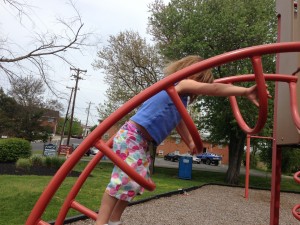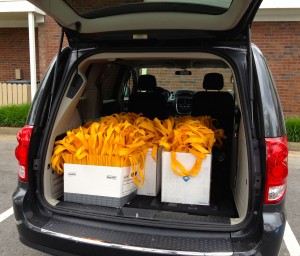
Preschoolers are such a joy!
I love preschoolers.
I love their sense of humor, their unending curiosity, their imagination and the way they put their whole selves into whatever they do. This week is a busy one for me. While my daughter-in-law is out of town for the week I am helping my son take care of their 2 preschoolers. Yesterday I had his oldest daughter, who is almost three, and my other granddaughter who just turned three over for the day. It was a hilarious and exhausting time of playing, swinging, listening to stories, jumping, running and fun for the two cousins.
After they left I couldn't help thinking about Judy's post "Pre-school...just reading" and about Sonlight's preschool programs.
A few years ago I was honored to be asked to write the daily activities for P4/5 . I like to think of them as "Fun with a Purpose."
While the daily activities in Sonlight's P4/5 are fun, that is not all they are. Most of them were intentionally developed and included to help children develop fine and large muscle coordination, to learn to follow directions and to do things in sequence.
Years ago, when my children were young, I did licensed home daycare and to keep my license I was required to take many classes on the developmental needs of preschool children. When I began working on the Sonlight preschool activities I thought back to what I learned back then, took into consideration what I knew from my years of working with a variety of preschool children and I looked at a host of state standards for children 4-6 years old. I researched ideas from many venues to come up with fun activities that help children meet milestones for things like skipping, hopping, peddling, tossing and catching a ball and so on.
 In addition to that, I wrote in many, many activities to help strengthen their small motor coordination: using tweezers, pinching cotton balls, picking up beans and other small items and so forth. These are not random activities. They were well thought out and researched activities included to help parents help their children to be well rounded, well coordinated individuals and to strengthen the muscles which will be needed for writing instruction in years to come.
In addition to that, I wrote in many, many activities to help strengthen their small motor coordination: using tweezers, pinching cotton balls, picking up beans and other small items and so forth. These are not random activities. They were well thought out and researched activities included to help parents help their children to be well rounded, well coordinated individuals and to strengthen the muscles which will be needed for writing instruction in years to come.
I combed developmental activity books for ideas, looking for just the right activities to be sure all the state standards were met. I didn't do this because I think the state is like the Wizard of Oz and knows all, but because their standards made sense, seemed logical and were well thought out and reasonable.
I also consulted with a preschool teacher and a preschool teacher of children with special needs to get their recommendations for fun, successful activities that children not only love but that would help develop muscles and coordination. All these things I incorporated into the P4/5 activities.
My extensive experience with preschoolers reinforced my belief that not only do kids love to play, but they need it in order to develop the necessary foundational skills to be successful in higher level learning. Because I am passionate about preschoolers, I spent a lot of time researching how to do this in a fun way.
I pray that when you are looking for a preschool program for your children, you will take a close look at Sonlight's great P3/4 and P4/5 programs. Not only are they a great way to spend quality time with your children while you introduce them to great literature, but they have fun activities that have an important purpose.
Take care,
Jill







 In addition to that, I wrote in many, many activities to help strengthen their small motor coordination: using tweezers, pinching cotton balls, picking up beans and other small items and so forth. These are not random activities. They were well thought out and researched activities included to help parents help their children to be well rounded, well coordinated individuals and to strengthen the muscles which will be needed for writing instruction in years to come.
In addition to that, I wrote in many, many activities to help strengthen their small motor coordination: using tweezers, pinching cotton balls, picking up beans and other small items and so forth. These are not random activities. They were well thought out and researched activities included to help parents help their children to be well rounded, well coordinated individuals and to strengthen the muscles which will be needed for writing instruction in years to come.
